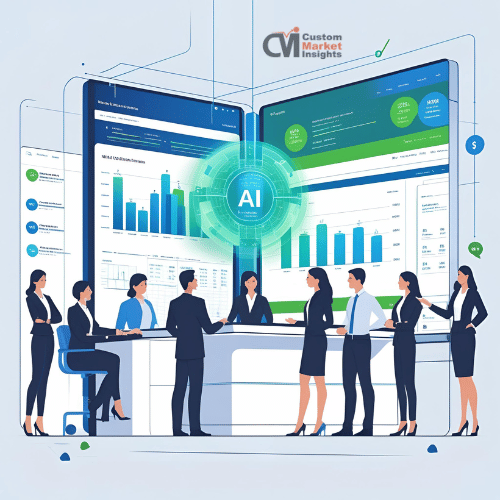As global markets become more unstable and investment products get more complicated, banks and other financial institutions are using artificial intelligence (AI) to provide better, quicker, and more customized wealth management services. Wealth management used to be just for rich people and private bankers, but AI-powered platforms are making it easier to use and smarter.
According to CMI’s most recent study, AI is not only making portfolio choices easier, but it is also allowing human advisors to provide clients more information, find new possibilities, and improve their connections with clients in ways that were never possible before.
How Wealth Management Has Changed:
Wealth management has always been a service that people with a lot of money used to have help with, and it was mostly for those with a lot of money. But now that AI is built into all digital channels, wealth services are growing outside this sector. Both fintech companies and big banks are using AI to look at huge amounts of data, predict how the market will behave, and make predictions in real time. This change is giving regular investors access to advanced advice services that were only available to the rich before.
An analyst at CMI WealthTech says, “AI is making wealth management more open, flexible, and predictive.” It helps clients of all income levels make smart, long-term financial choices with confidence.
Data-driven Insights For Hyper-Personalization:
One of the best things about AI in wealth management is that it can create investment plans that are very specific to each person. AI algorithms take a lot of different types of information, such as income patterns, spending habits, life objectives, risk tolerance, and even psychographic data, and use it to make personalized investment plans for each customer.
AI-based platforms don’t use broad asset allocation templates as traditional advising models do. Instead, they constantly update their recommendations depending on real-time market data and changes in client preferences. Wealthfront, Stash, and India’s ET Money are some of the top robo-advisory platforms that already use AI to make sure that portfolios match each person’s financial goals and life events.
The most recent Fintech Trends Analysis from CMI shows that AI-powered customization boosts customer happiness and retention rates by more than 30%. This shows how useful it is both as a technology and a relationship tool.
Portfolio Management using AI:
AI is changing how portfolios are built and rebalanced by adding real-time analytics, risk modeling, and market sentiment monitoring. AI systems can quickly change how they allocate funds to lower risk and increase returns by finding micro-trends and correlations across global markets.
Some businesses employ natural language processing (NLP) to read news articles, financial reports, and social media posts to try to guess how stocks will move or how volatile a certain industry will be. These predictive analytics techniques are especially useful in markets that aren’t sure what will happen next. They assist wealth managers and their customers in remaining ahead of the game.
In 2025, a top European wealth management business said that its AI platform helped keep portfolio losses to a minimum during a market drop, beating many traditional fund managers. CMI experts point out these kinds of examples to show how AI might be useful in making active investment strategies.
Giving More Power To Human Advisors:
AI is not taking the place of wealth advisers; it is making them better at what they do. Today, financial advisers have AI dashboards that provide them with fast information, scenario evaluations, and solutions that are tailored to each client. This makes talks more meaningful, decisions happen faster, and clients are more likely to get involved. These solutions help simplify time-consuming back-office tasks like compliance checks, document processing, and performance reporting. This lets advisers focus on creating relationships and providing comprehensive advice. CMI says that companies that used AI to help their advisors witnessed a 20–25% improvement in productivity in 2024 alone.
A CMI analyst said, “AI lets wealth managers go from being product pushers to strategic partners.” “That change is necessary to gain trust and create long-term value for clients.”
Making Investment Opportunities Available To Everyone:
AI’s role in making money management more accessible to everyone may be its most important change. AI is making wealth services available to more people, including millennials, gig workers, and those who have never had a bank account before. This is because AI can do things like financial planning, portfolio management, and tax optimization. AI-powered platforms like Robinhood and Grow let you invest without paying commissions, buy fractional shares, and set up automatic investment pathways. They also offer selected content and instructional tools to help consumers learn more about money and feel more secure about it.
According to CMI’s Global WealthTech Outlook, more than 60% of retail investors throughout the world would use AI-powered advisory services as their main source of financial advice by 2030.
Managing Risks and Following Rules:
Wealth management always involves some risk, but AI is making it easier to handle. Machine learning algorithms look at how much macroeconomic, geopolitical, and liquidity risk a portfolio is exposed to. These models do stress tests and let management know about such weaknesses before they hurt returns. AI is also making regulatory compliance easier, even as it is becoming more complicated. Intelligent systems can automatically make reports, find problems with transactions, and highlight any violations of fiduciary obligation. AI is becoming more and more important in places like the EU, where laws like MiFID II require tight reporting criteria.
The 2025 study from CMI on Financial Regulatory Technologies (RegTech) says that wealthy businesses that used AI to help them follow the rules witnessed a 40% drop in regulatory fines over the last two years.
Managing Relationships and Getting Clients Involved:
Managing money is as much about trust as it is about numbers. AI tools are helping companies develop better relationships with their clients by sending them tailored information, nudging their behavior, and predicting their needs. Chatbots and voice assistants now give you portfolio updates, market information, and financial advice in a conversational way 24 hours a day, 7 days a week.
Some companies are utilizing sentiment analysis to figure out how their customers are feeling and change how they talk to them. For example, if a customer is worried during a downturn, AI systems can tell advisers to get in touch with them to reassure them and suggest new plans.
CMI’s study showed that companies that used AI-driven relationship management tools saw a 35% increase in their net promoter ratings (NPS), which is a significant metric of how happy and loyal their customers are.
The Rise of Smart Wealth: Market Outlook
AI is changing the way people handle their money, going from reactive to proactive and from one-size-fits-all to hyper-personalized. CMI’s Global WealthTech Market Forecast says that the AI-powered wealth management market will expand at a CAGR of 26% and reach more than $80 billion by 2032. The need for more openness, accessibility, and smart automation in financial services is driving this expansion. BlackRock, Vanguard, and J.P. Morgan are all making smart investments in AI platforms. At the same time, more and more companies are changing the way people handle their money in the digital era. Fidelity released an AI-based financial planning bot in early 2025 that lets customers simulate different retirement scenarios depending on market changes and personal events. This is a hint of things to come.
Final Thoughts: An Investor Who Is More Empowered
AI will make money management more human, not less, as it becomes better. AI takes care of the complicated things behind the scenes, which gives both advisers and clients more time and mental space to focus on their beliefs, goals, and long-term vision.
As this technology becomes more and more a part of personal finance, however, data privacy, ethical AI design, and openness must remain major considerations. AI gives companies that value both honesty and new ideas a once-in-a-lifetime chance to develop lasting financial ties in a world that is becoming more digital.
Connect with our Experts


